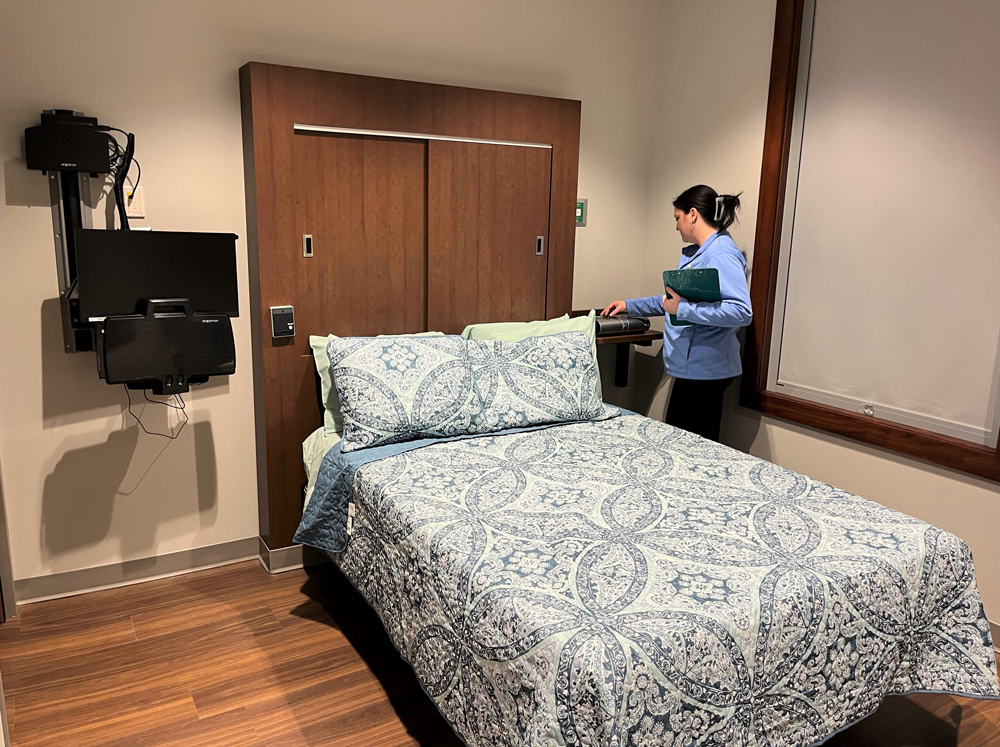
Rest easy
Community Healthcare System’s sleep studies, treatments can put you on a path to wellness
When Sandy Reynolds was diagnosed with a heart condition, her physician ordered a slew of tests, including one that took her by surprise — a sleep study.
Community Care Network cardiologist Sulman Hussain, DO, wanted to check for obstructive sleep apnea (OSA), a potentially serious sleep disorder in which breathing repeatedly stops and starts.
Reynolds, of Highland, was recently diagnosed with mitral valve regurgitation, a type of heart valve disease in which the valve between the left heart chambers does not close completely, causing blood to leak backward across the valve.
Frequent drops in blood oxygen while sleeping increase blood pressure and strain the cardiovascular system. The more severe the obstructive sleep apnea, the greater the risk of coronary artery disease, heart attacks, heart failure and strokes.
Reynolds was anxious about being able to fall asleep in what she thought would be a hospital-like setting. After arriving for her appointment, she quickly was put at ease.
“It was like being in a hotel room, or even like being in my own bedroom,” Reynolds said of her experience at Community Hospital Sleep Diagnostics in Munster. The center is one of three sleep testing facilities in Community Healthcare System, including St. Catherine Hospital Sleep Diagnostics in East Chicago and St. Mary Medical Center Sleep Diagnostics in Hobart.
A sleep technologist readied Reynolds for her night of testing. The preparation took about a half an hour and included getting fit with electrodes, a sleep mask and a Continuous Positive Airway Pressure (CPAP) machine to monitor her sleep.
“I was able to fall asleep in about 15 minutes,” she said.
Reynolds’ test results netted comforting news. She did not have sleep apnea and was getting enough oxygen throughout the night.
“When you get to a certain age, you feel like your check engine light is blaring,” said Reynolds, who is 59 years old. “I was fine four years ago, and then I was getting dizzy and had heart palpitations, and I was thinking, ‘What is wrong with me?’ With all the stuff going on, it was a great comfort to know that I don’t have sleep apnea and I am getting enough oxygen.”
Get Talking
Loud snoring may indicate a potentially serious problem. However, not everyone who has sleep apnea snores. Talk to a doctor about scheduling a sleep study if you have the following signs or symptoms of sleep apnea:
- Awakening with a dry mouth
- Difficulty paying attention while awake
- Difficulty staying asleep (insomnia)
- Episodes in which you stop breathing during sleep
- Excessive daytime sleepiness (hypersomnia)
- Gasping for air during sleep
- Irritability
- Loud snoring
- Morning headache
It also is important to talk to your doctor about a sleep study if you are considering weight-loss surgery.
“There is a high incidence — about 78% — of obstructive sleep apnea in individuals seeking bariatric surgery,” said Marcia Alpuche, supervisor of Community Hospital’s Sleep Diagnostic Center. “Unfortunately, while weight loss may provide significant improvements in OSA, it usually does not result in a complete cure.”
Get Tested
The only way to determine if a person has OSA is through a sleep study.
“Your physician should set up an appointment for a sleep study, or you may self-refer to one of our three Sleep Diagnostic Centers,” Alpuche said.
The sleep study — also called a polysomnogram — is a simple, non-invasive test used to monitor sleep and breathing patterns.
“The patient-friendly environment offers the comforts of home – a full-sized bed, flat-screen television and private bathroom – while you are evaluated by highly trained sleep physicians,” Alpuche said. “Quality sleep is essential to our emotional and physical well-being.”
Get Treatment
Obstructive sleep apnea is treatable.
CPAP is the most commonly prescribed treatment. It involves a mask and hose to send pressurized air into the airway to keep it open during sleep.
Community Healthcare System also offers Inspire Therapy.
Leonard Covello, MD, an otolaryngologist with Community Care Network, is the only physician in Northwest Indiana currently offering the Inspire implant procedure.
Inspire, a small device inserted under the skin in an outpatient procedure, works with a patient’s natural breathing process to treat sleep apnea. It delivers mild stimulation to key airway muscles, allowing the airway to open during sleep. The patient uses a small handheld remote to activate Inspire before bed and deactivate it when he or she wakes up.
“Sleep shouldn’t be a battle,” Covello said. “Sleep should be rest from the battle.”
